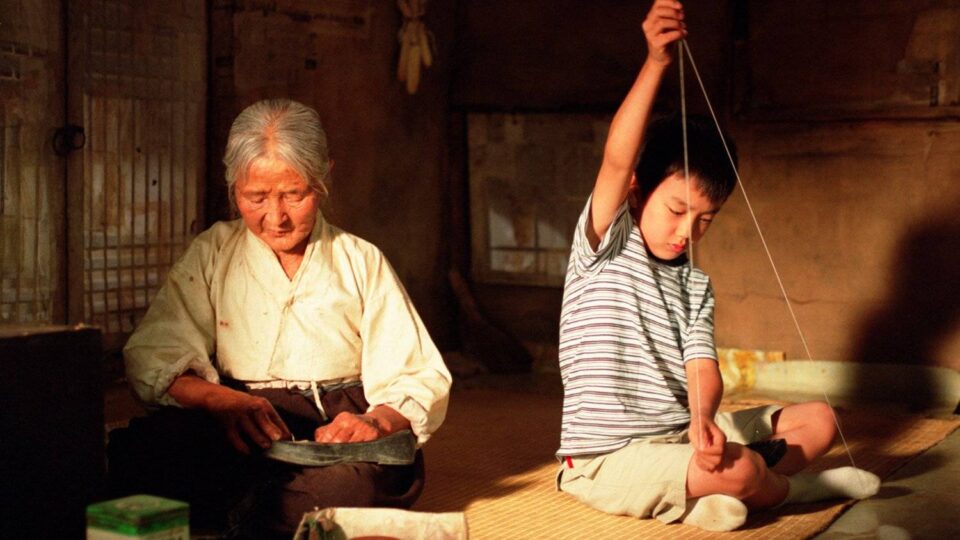Five Must-Watch Korean Drama Films
Features classics including ‘The Way Home,’ ‘Treeless Mountain,’ ‘Poetry,’ ‘Right Now, Wrong Then,’ and ‘House of Hummingbird’

Kim Eul-boon (left) and Yoo Seung-ho (right) in a still from 'The Way Home.' Photo courtesy of HanCinema.
The following movies are real gems of Korean cinema, and if you’re an avid follower of Korean films or just a film fan, you’ve probably seen them before. If not, I suggest watching them because I’m sure they’ll add to your experience of quality movies.
The Way Home (2002) – Lee Jeong-hyang
Seven-year-old city boy Sang-woo (Yoo Seung-ho) and his rural mute 78-year-old grandmother (Kim Eul-boon) are central to this tearjerker, which starts with complex dynamics between them and builds into profound emotional connections.
As Sang-woo comes to live with his needy grandmother while his mother is looking for a new job in Seoul, the film chronicles his initial resistance, disdain for his newfound rural existence, and dislike for the old woman juxtaposed with her compassion and unconditional love.
Sang-woo’s attitude gradually changes through sentimental and often lighthearted moments, and he grows to appreciate the experience and beauty of his grandmother’s way of life, thus forging a deeper attachment that overcomes their physical and cultural differences.
Treeless Mountain (2008) – So Yong-kim
Treeless Mountain has Jin (Kim Hee-yeon) and Bin (Kim Song-hee), two sisters who are forced to live with their alcoholic aunt after their mother leaves them high and dry. In the ensuing days, the children grapple with their aunt’s lacking interest and a childhood without parents.
Their quest for safety and comfort amid struggles, their resilience, and the scene where they pinky swear at the final moments of the film, reinstates their faith that their mother will eventually come back for them, highlighting the value of hope in life and the importance of finding inner peace and strength in a state of pain.
Poetry (2010) – Lee Chang-dong
In her 60s, Yang Mi-ja (Yoon Jeong-hee) takes an interest in poetry while dealing with Alzheimer’s and tending to her reckless grandson, Jong-wook (Lee David), who turns out to have been part of a gang rape.
The film goes over the intricate layers of everyday life by fusing themes of reality, sexual abuse, and loss, alongside the healing power of creativity.
Mi-ja’s experiences provide insight into the complexities of life. She’s dealing with an ugly truth amid people who are determined to suppress it, her conflicts over the issue, and her fading memory. And apparently, she tries to make sense of what remains through poetry.
Right Now, Wrong Then (2015) – Hong Sang-soo
Ham Cheon-soo (Jung Jae-young), a filmmaker, travels to Suwon and spots Yoon Hee-jeong (Kim Min-hee), a painter. He tries to woo her into hanging out with him in the first segment of the story. They meet again in the film’s second segment; their interactions and disclosures become central to the narrative.
The film’s two halves show the same events playing out in slightly different ways, an impressive representation of director Hong’s distinctive style. The first half presents Chun-soo as a little distant and reclusive, while the second half shows a more vulnerable and reflective side, showcasing Hong’s adept exploration of the subtleties of human behavior.
The film’s minimal aesthetic beautifully builds on his signature themes of daily life with its leisurely pacing and focus on subtle human interactions in regular places, over food and drinks.
House of Hummingbird (2018) – Kim Bora
House of Hummingbird introduces 14-year-old Eun-hee (Park Ji-hu), a sensitive schoolgirl navigating family issues, emerging friendships, and the search for self-identity during a crucial time in her life—her adolescent years.
The depictions of South Korea in the 1990s, its shifting gender dynamics and attitudes as a result of growing urbanization at the time, and the impact of a tragic event like the Seongsu Bridge collapse all add to the film’s drama and storytelling.
It’s an amazing coming-of-age story—a broader perspective on the experience of growing up—with important life lessons, the most important being that “when bad happens, there is always good coming along.”







